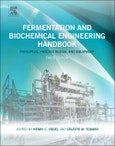A complete reference for fermentation engineers engaged in commercial chemical and pharmaceutical production, Fermentation and Biochemical Engineering Handbook emphasizes the operation, development and design of manufacturing processes that use fermentation, separation and purification techniques. Contributing authors from companies such as Merck, Eli Lilly, Amgen and Bristol-Myers Squibb highlight the practical aspects of the processes-data collection, scale-up parameters, equipment selection, troubleshooting, and more. They also provide relevant perspectives for the different industry sectors utilizing fermentation techniques, including chemical, pharmaceutical, food, and biofuels.
New material in the third edition covers topics relevant to modern recombinant cell fermentation, mammalian cell culture, and biorefinery, ensuring that the book will remain applicable around the globe. It uniquely demonstrates the relationships between the synthetic processes for small molecules such as active ingredients, drugs and chemicals, and the biotechnology of protein, vaccine, hormone, and antibiotic production. This major revision also includes new material on membrane pervaporation technologies for biofuels and nanofiltration, and recent developments in instrumentation such as optical-based dissolved oxygen probes, capacitance-based culture viability probes, and in situ real-time fermentation monitoring with wireless technology. It addresses topical environmental considerations, including the use of new (bio)technologies to treat and utilize waste streams and produce renewable energy from wastewaters. Options for bioremediation are also explained.
Table of Contents
Part I Fermentation 1. Fermentation Pilot Plant 2. Mammalian Cell Culture System 3. Bioreactors for Plant Cell Tissue and Organ Cultures 4. Nutritional Requirements in Fermentation Processes 5. Fermentation for Biofuels and Bio-Based Chemicals
Part II Equipment Design 6. Fermentation Design 7. Agitation
Part III Recovery 8. Filtration 9. Cross-Flow Filtration 10. Distillation for Recovery of Biofuels and Bio-Based Chemicals 11. Solvent Extraction 12. Evaporation 13. Centrifugation 14. Drying
Part IV Purification 15. Crystallization 16. Chromatography
Part V Plant Operations 17. Water Systems for Pharmaceutical Facilities 18. Sterile Formulation 19. Environmental Concerns 20. Instrumentation and Control Systems 21. Statistical Methods for Fermentation Optimization








